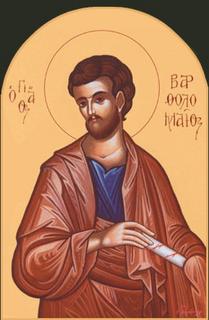This is a continuation of the 73 Steps to Spritual Communion with God by Michael Dubruiel. The previous posts are in the archives to the right. This is step 52:
(52) To guard one's tongue against bad and wicked speech.
This counsel will be followed by another which was read while I was recently a guest at the monastic table of the monks at Saint Meinrad Archabbey-namely "not to love much speaking," which solves much of the problems that we might encounter with this counsel. Guarding one's tongue, catching oneself before one speaks, is a valuable maxim especially if you are an extrovert who speaks whatever crosses your mind. The same might be said for introverts who are apt to do the same in writing (and in the days of blogs, instant messaging and email--the dangers are plenty!).
What is "bad" and "wicked" speech?
If we look to the Gospels for an answer we might be surprised at what Jesus identifies as such--vows:
"Again you have heard that it was said to the men of old, `You shall not swear falsely, but shall perform to the Lord what you have sworn.' But I say to you, Do not swear at all, either by heaven, for it is the throne of God, or by the earth, for it is his footstool, or by Jerusalem, for it is the city of the great King. And do not swear by your head, for you cannot make one hair white or black. Let what you say be simply `Yes' or `No'; anything more than this comes from evil", (Matthew 5: 33-37).
It seems like this says pretty well what we are to avoid. Yet isn't it strange how this basic teaching of Jesus is ignored? How we still speak vows before God and man?
The teaching of Jesus is pretty clear that we are not God and we do not know what the future holds--God alone knows this. So any attempt on our part to declare that we will do something forever is actually rather unchristian--I know that this will be misunderstood so let me clarify. God is the source of our existence and our life. Every act that we do throughout the day should be dependent upon His Will for us. Anytime that our attitude is that we can do anything without his help we are as Jesus says doing something that "comes from evil."
(52) To guard one's tongue against bad and wicked speech.
This counsel will be followed by another which was read while I was recently a guest at the monastic table of the monks at Saint Meinrad Archabbey-namely "not to love much speaking," which solves much of the problems that we might encounter with this counsel. Guarding one's tongue, catching oneself before one speaks, is a valuable maxim especially if you are an extrovert who speaks whatever crosses your mind. The same might be said for introverts who are apt to do the same in writing (and in the days of blogs, instant messaging and email--the dangers are plenty!).
What is "bad" and "wicked" speech?
If we look to the Gospels for an answer we might be surprised at what Jesus identifies as such--vows:
"Again you have heard that it was said to the men of old, `You shall not swear falsely, but shall perform to the Lord what you have sworn.' But I say to you, Do not swear at all, either by heaven, for it is the throne of God, or by the earth, for it is his footstool, or by Jerusalem, for it is the city of the great King. And do not swear by your head, for you cannot make one hair white or black. Let what you say be simply `Yes' or `No'; anything more than this comes from evil", (Matthew 5: 33-37).
It seems like this says pretty well what we are to avoid. Yet isn't it strange how this basic teaching of Jesus is ignored? How we still speak vows before God and man?
The teaching of Jesus is pretty clear that we are not God and we do not know what the future holds--God alone knows this. So any attempt on our part to declare that we will do something forever is actually rather unchristian--I know that this will be misunderstood so let me clarify. God is the source of our existence and our life. Every act that we do throughout the day should be dependent upon His Will for us. Anytime that our attitude is that we can do anything without his help we are as Jesus says doing something that "comes from evil."







